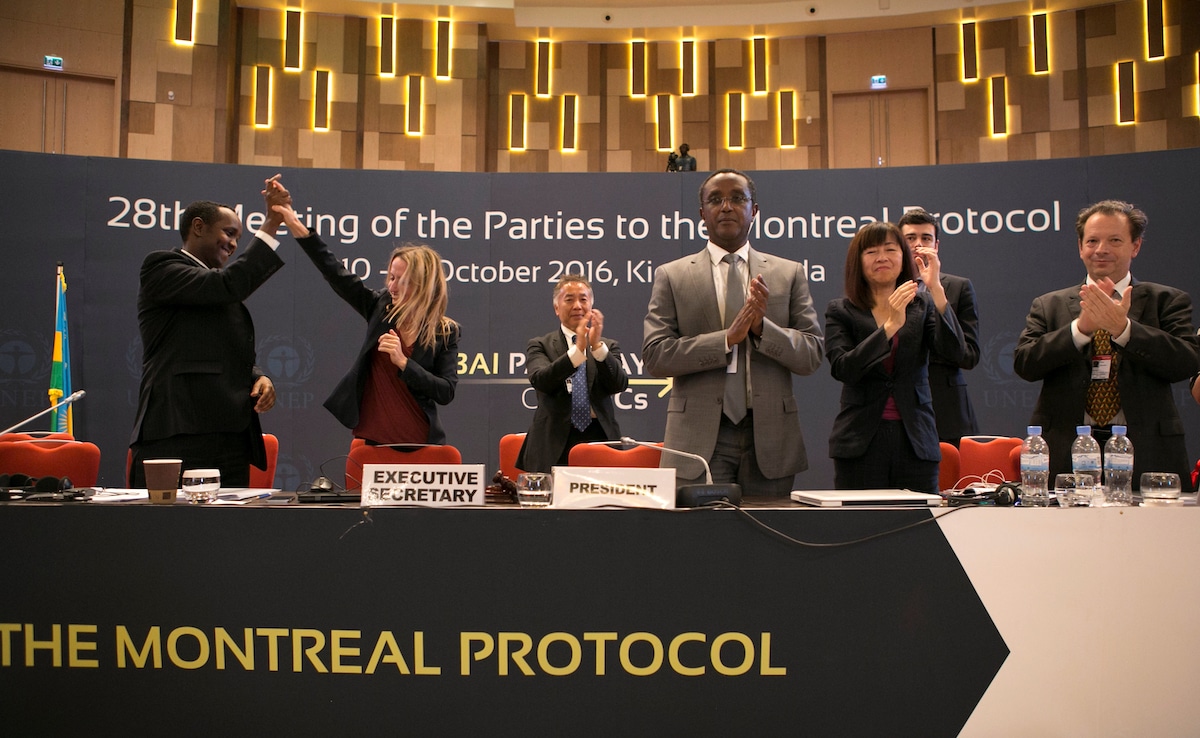U.S. Ratifies First Climate Treaty in 30 Years

 Why you can trust us
Why you can trust us
Founded in 2005 as an Ohio-based environmental newspaper, EcoWatch is a digital platform dedicated to publishing quality, science-based content on environmental issues, causes, and solutions.
The U.S. Senate ratified a treaty Wednesday that could prevent half a degree Celsius — or a full degree Fahrenheit — of global warming by 2100.
The legislative body voted 69 to 27 to approve the Kigali Amendment to the Montreal Protocol. The agreement, which has been ratified by 137 other countries so far, would end the use of climate-warming hydrofluorocarbons (HFCs) that are 1,000 times more potent than carbon dioxide. It is also the first international climate treaty the U.S. has joined in three decades, The New York Times pointed out.
“Ratifying the Kigali Amendment along with passing the Inflation Reduction Act is the strongest one-two punch against climate change any Congress has ever taken,” Senate Majority Leader Chuck Schumer (D-NY) said in a statement, referring to a landmark act passed in August that earmarked $370 billion for climate and energy programs.
The Kigali Amendment is the latest step in an international attempt to find a way to refrigerate without harming the planet. In the 1970s, scientists discovered that common air conditioner and refrigeration chemicals known as chlorofluorocarbons (CFCS) were actually thinning the ozone layer that protects Earth from the sun’s harmful ultraviolet rays, according to the U.S. Department of State. To prevent this, world leaders finalized the Montreal Protocol in 1987 to phase out the use of CFCs and other ozone-depleting substances. It was the first global treaty to be signed by every nation on Earth and has been called the world’s most effective and successful environmental agreement.
However, solving one problem led to another. Manufacturers began to replace CFCs with HFCs, which do not deplete the ozone layer but do contribute to the climate crisis and could represent seven to 19 percent of greenhouse gas emissions by 2050, according to the UN Environment Programme (UNEP).
World leaders therefore established the Kigali Amendment in Kigali, Rwanda, in 2016 to phase out HFCs as well. According to the agreement, developed nations will reduce the substances to around 15 percent of 2012 levels by 2036, developing nations will reduce them to 20 percent of 2021 levels by 2045 and some especially hot nations will have until 2047 to reduce them to 15 percent of 2025 levels, according to The New York Times. Overall, the goal is to cut the use of HFCs by 80 to 85 percent by the late 2040s, UNEP said.
One one hand, U.S. ratification of the treaty is largely symbolic. That’s because Congress passed the American Innovation and Manufacturing Act in 2020, which empowers the U.S. Environmental Protection Agency to regulate HFCs with a goal of cutting the production and importing of the chemicals by 85 percent in the next 15 years, The New York Times explained. On the other hand, the importance of the vote’s symbolic value should not be dismissed.
“This treaty shows that it’s not hopeless to solve climate change,” Institute for Governance & Sustainable Development President Durwood Zaelke told The New York Times.
It also shows that the U.S. — which helped negotiate the amendment during the end of the Obama administration but withdrew from the Paris climate agreement under Trump — is back on the international climate bandwagon.
“The United States is back at the table leading the fight against climate change,” President Joe Biden said in a statement following Wednesday’s vote. “As more countries join the United States in ratifying this amendment, we can prevent up to half a degree Celsius of warming this century, a significant contribution to fighting climate change and protecting communities from more extreme impacts.”
The ratification of the Kigali Amendment is hopeful and unique as a U.S. climate action in two other ways. It earned bipartisan support and it was backed by the business interests impacted by the decision. Republican Senator John Neely Kennedy of Louisiana was actually the lead sponsor of the 2020 act phasing out HFCs, and the ratification was backed by both the Chamber of Commerce and the National Association of Manufacturers, according to The Washington Post.
“Businesses supported it because it drives American exports; climate advocates championed it because it will avoid up to half a degree of global warming by the end of the century; and world leaders backed it because it ensures strong international cooperation,” U.S. climate envoy John F. Kerry, who also helped negotiate the deal in Rwanda, said in a statement reported by The Washington Post.
Subscribe to get exclusive updates in our daily newsletter!
By signing up, you agree to the Terms of Use and Privacy Policy & to receive electronic communications from EcoWatch Media Group, which may include marketing promotions, advertisements and sponsored content.

 233k
233k  41k
41k  Subscribe
Subscribe 




